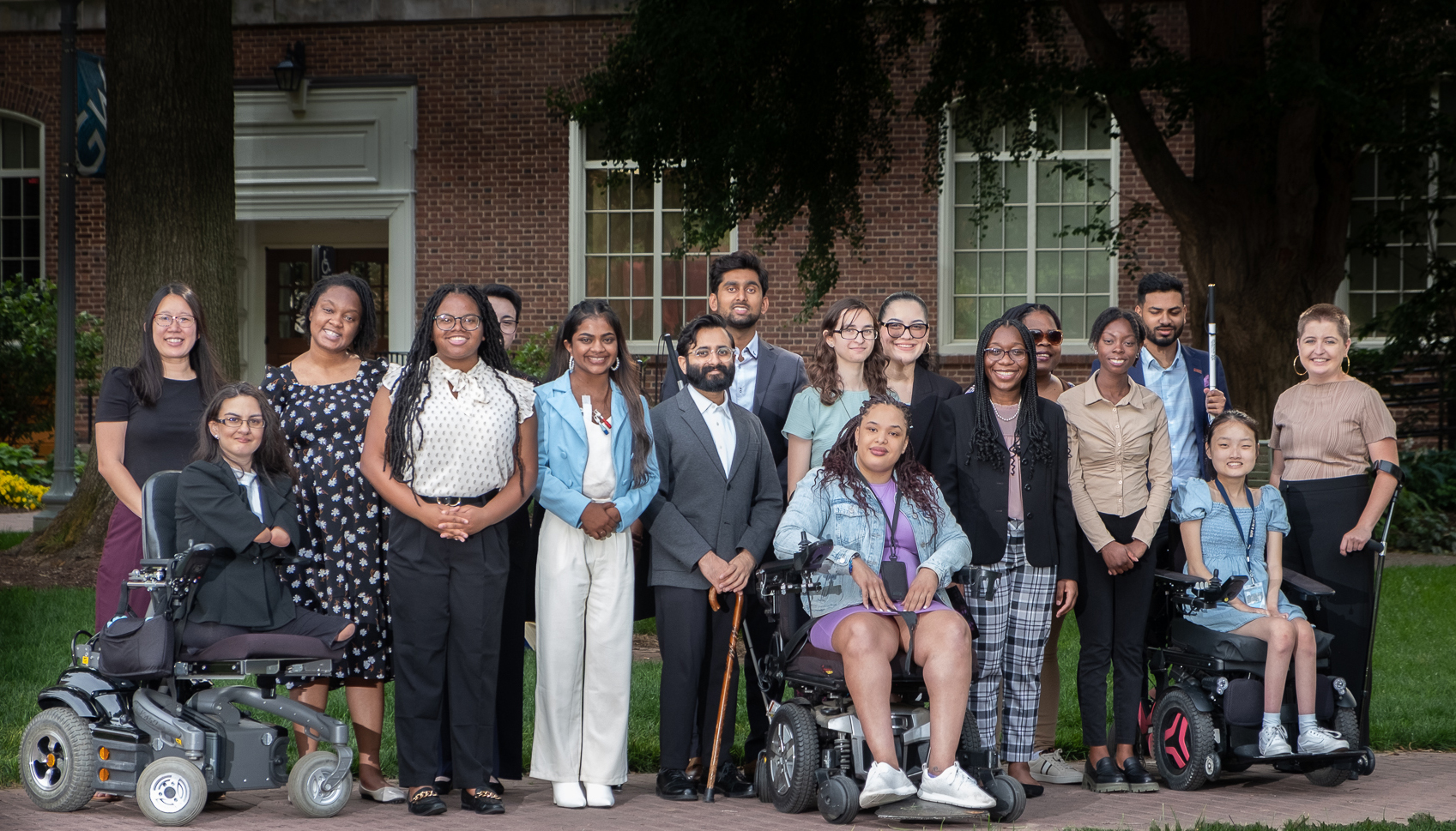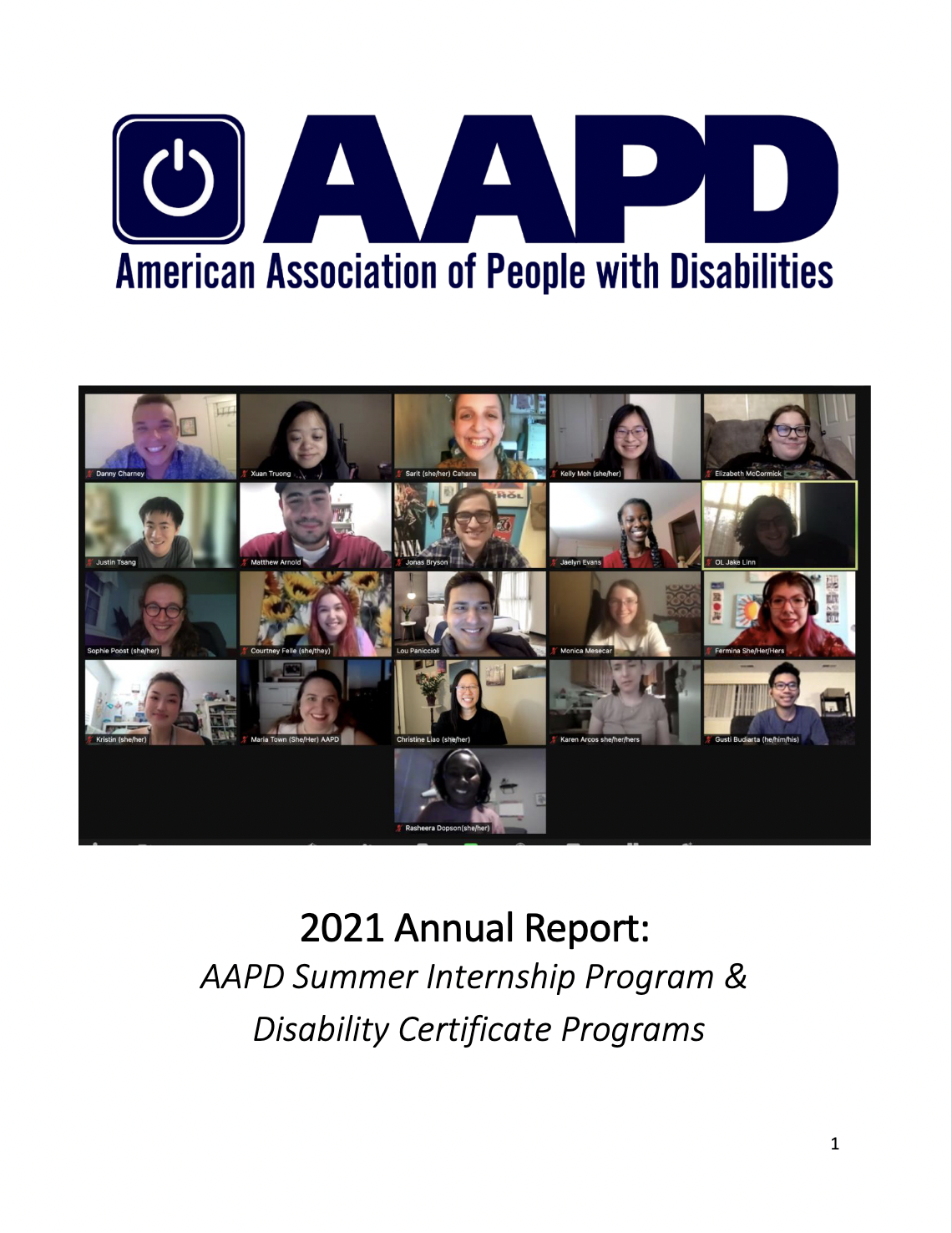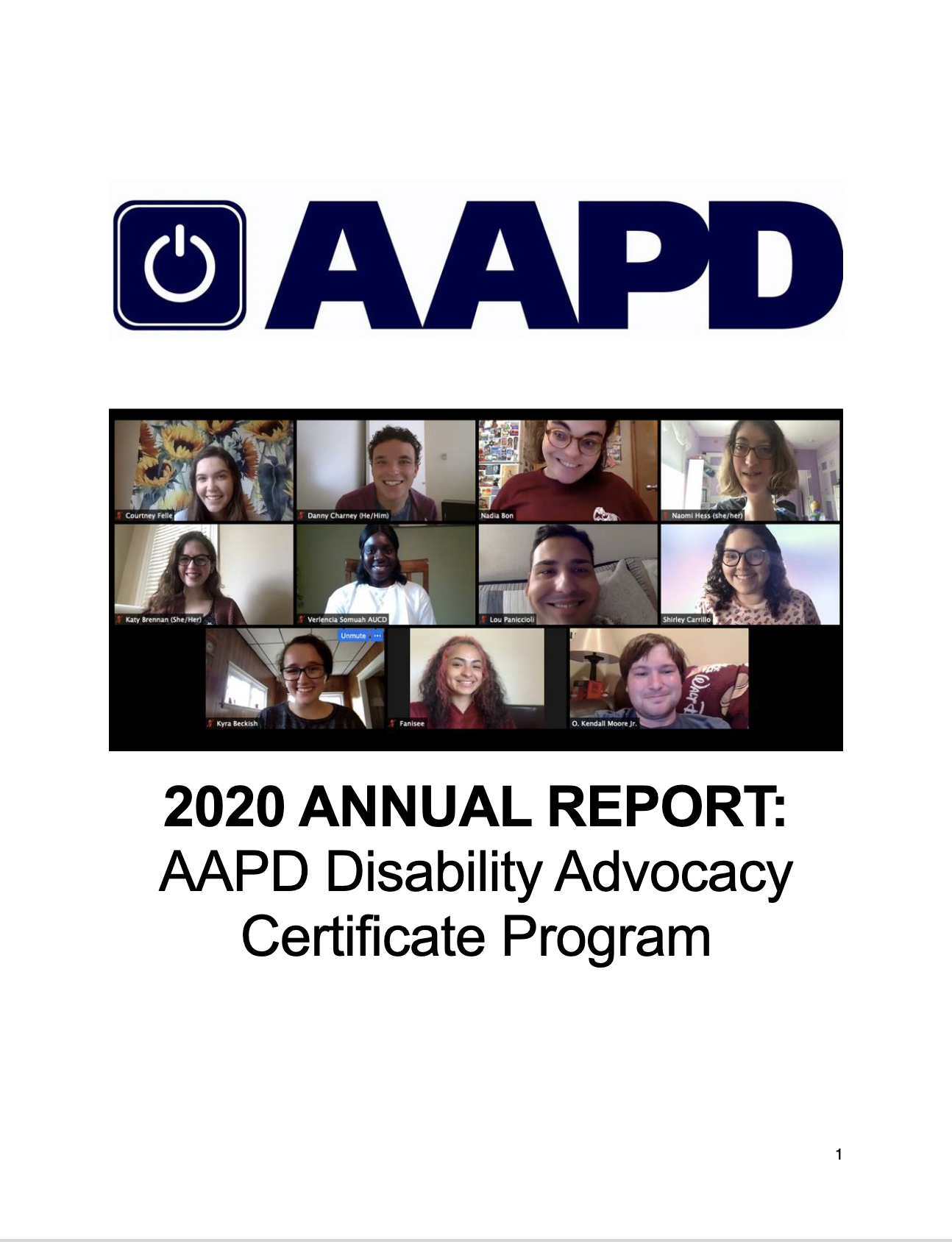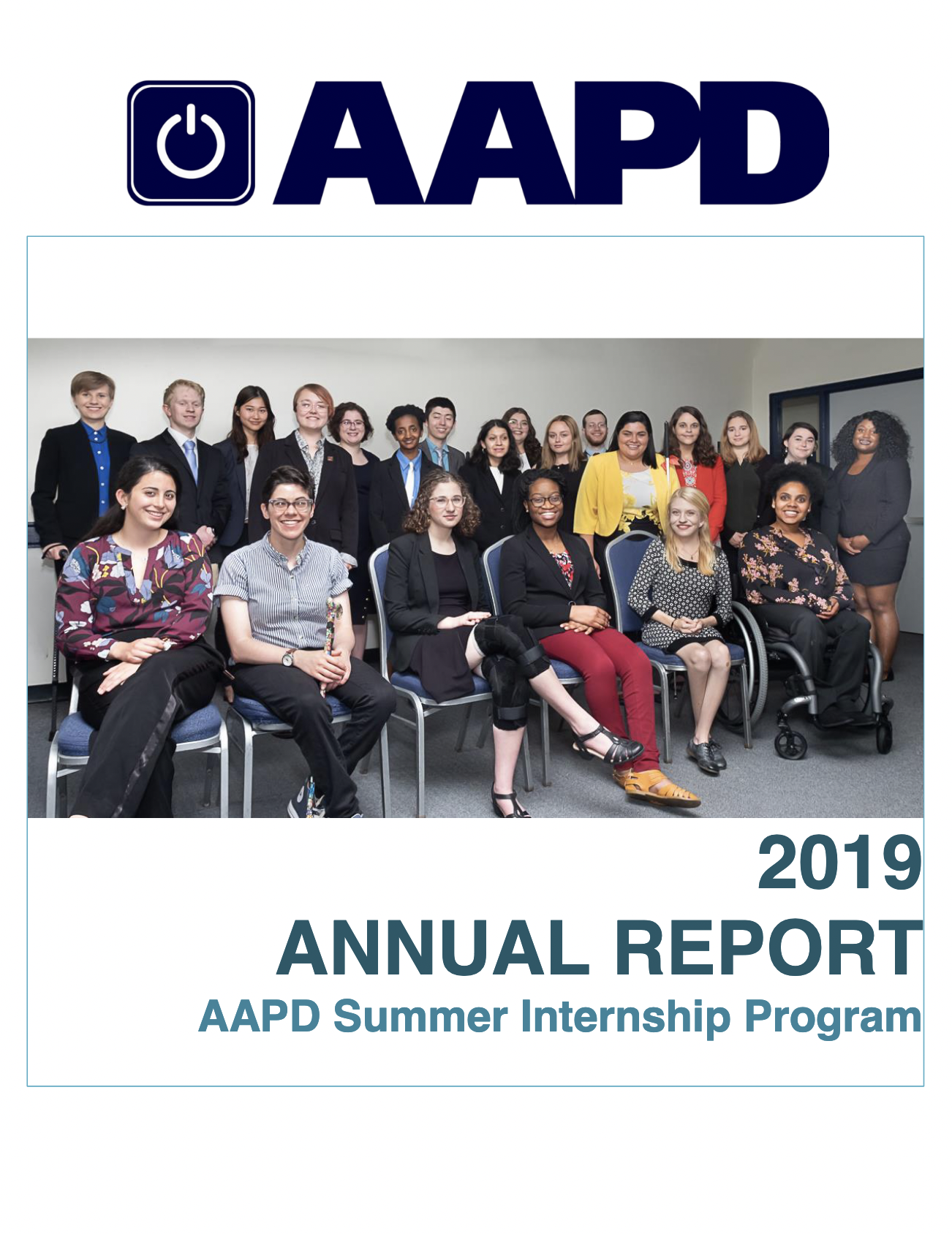Summer Internship Program
The AAPD Summer Internship Program is a professional and career development opportunity for disabled students and recent graduates to access meaningful employment, gain leadership skills, and connect to the broader disability community.

In 2002, AAPD launched the Summer Internship Program to develop the next generation of leaders with disabilities. For 20 years, we have placed college students, graduate students, law students, and recent graduates with all types of disabilities in paid summer internships with Congressional offices, federal agencies, nonprofit and for-profit organizations within the Washington, DC area. The AAPD Summer Internship Program advances participants’ career opportunities, deepens their leadership skills, and meaningfully connects them to the broader disability community.
The 2024 Summer Internship Application
Applications for Summer 2024 are now closed. Please check back in early Fall 2024 for more information about Summer 2025.
Throughout the summer, AAPD interns will:
- Participate in a 1-week orientation to prepare for their internship, meet with the cohort, and learn about the disability rights movement
- Participate in the Disability Advocacy Certificate Program to build advocacy skills to advocate on the local, state, and national level.
- Attend events and network on Capitol Hill, conferences, community events, briefings, and more
- Connect one-on-one with a mentor who provides career guidance
AAPD interns are paid a living stipend, a technology and internet stipend for remote interns, transportation to and from Washington, D.C., and fully accessible housing or a housing stipend if remote. Due to minimizing barriers to participation, we are able to recruit a diverse cohort of interns. As a result, we connect our host employers to talented emerging leaders with disabilities.
AAPD Summer Internship Program 2024 Information Session Recording and Resources:
Internship Application Process and FAQs
Who can apply?
To be an AAPD summer intern, you must:
- Identify as a person with a disability
- Be a current student or recent graduate of a U.S. based school or program
- Have a high school diploma or equivalent by May 2024
We often get questions about who can apply, so below is some additional information about the requirements:
- You will not be required to share your specific disability or provide any documentation. You just need to identify as a person with a disability
- A recent graduate is anyone who has graduated from an educational setting or a skills-based program in the last five years. For Summer 2024, this includes anyone who graduated in Summer 2019 or later
- U.S. citizenship is not required for our program. It may be required for specific placement sites. However you must have the required work authorization documents.
- You do not need to be a traditional degree-seeking college student. A U.S. based school or program could include a university, a community or technical college, a skills-based transition program, a non-degree seeking inclusive college program, an apprenticeship or trade school.
If you have a question about if you are able to apply, please email internships@aapd.com or call 202-975-0241.
AAPD is committed to cultivating a diverse class of interns every summer. We select interns who demonstrate their passion and vision of contributing to an inclusive workforce. In order to create gainful employment opportunities for people with disabilities, we recognize the importance of selecting a class of interns that reflect the diversity of our community. We strongly encourage individuals from historically excluded groups to apply.
How to apply?
You can view the entire Summer 2024 application in our Summer Application Google Document
You must submit your application through the online portal. It will include:
- Applicant information
- Internship placement preference
- Essays
- Resume
- Two (2) references
- At least one of which is a professional reference
If the online portal is not accessible or you would like to request a disability accommodation to fill out the application, please reach out to internships@aapd.com or call 202-975-0241.
Placement Sites
AAPD’s Internship placements fall into the following categories:
- Congressional offices: Current Representative or Senator’s office in U.S. Congress
- Federal agency: Government organizations that direct policy, programs, and resources at the national level.
- Nonprofit: Organizations that typically use its funds for the community to further a social cause or advocate for a shared point of view rather than using the funds internally
- For-profit: Private sector companies that have an interest in disability inclusion
- STEM internship: Placed in federal agencies with an emphasis on science, technology, engineering, and mathematics.
Intern Expectations
- By participating in the program, AAPD interns will:
- Work full-time four days a week for 32 hours in paid internships with Congressional offices, federal agencies, nonprofits, or for-profit organizations.
- Attend AAPD-sponsored activities, including the Disability Advocacy Certificate Program.
- Communicate regularly leading up to and throughout the program. We will use technology like Google, Zoom, and email to communicate.
- Attend orientation at the beginning of the program.
- Follow the Code of Conduct and if in-person, roommate and housing agreements.
- Follow the AAPD COVID-19 protocols. For information about COVID-19 precautions, see our 2023 COVID-19 protocols. These are subject to change based on current public health guidance.
Frequently Asked Questions (FAQs)
Q: How can I learn more about potential internships?
A: Please review the AAPD Placement Site Overview for more information.
Q: Can I choose my placement site?
A: AAPD will strive to place all interns with a placement site that matches their career goals and preferences, but AAPD has the final decision on all placement sites.
Q: What if I want to be placed in a specific Congressional office or only in Congressional offices of a specific political party?
A: Since AAPD is a nonpartisan organization with many relationships with Congressional offices, we cannot guarantee a specific Congress person and/or placement with a member of a specific party. AAPD places interns in both Republican and Democratic offices.
Q: How much is the stipend?
A: For Summer 2023, AAPD interns received a stipend equating to $18 an hour for 32 hours over 10 weeks. This stipend covered living and meal expenses for the interns for their summer.
Q: If I want to participate remotely, will I get a housing stipend?
A: Yes. For 2023, AAPD provided a housing stipend up to $2,000 per month. Housing stipend is determined on rent and utility bills.
Q: If I join in-person in Washington, D.C., where will I live?
A: AAPD will cover housing for interns to live in fully accessible dorm-style housing at George Washington University. Interns will have an opportunity to request specific housing accommodations.
Q: I have questions about the Disability Advocacy Certificate Program.
A: Please visit our Certificate Program page to learn more.
If you still have questions, please email internships@aapd.com.
Support for the 2023 Summer Internship Program is provided by:
- Aid Association for the Blind, District of Columbia
- Arconic Foundation
- Microsoft
- United Airlines
Thank you so much to our generous sponsors for supporting these talented up-and-coming professionals.
Placement Sites
AAPD has previously placed interns in a variety of organizations. Learn more about past and potential future placement sites
Summer Internship Program Annual Report
2023 Summer Interns

2021 Summer Internship Program Annual Report

2020 Disability Advocacy Certificate Program Annual Report

